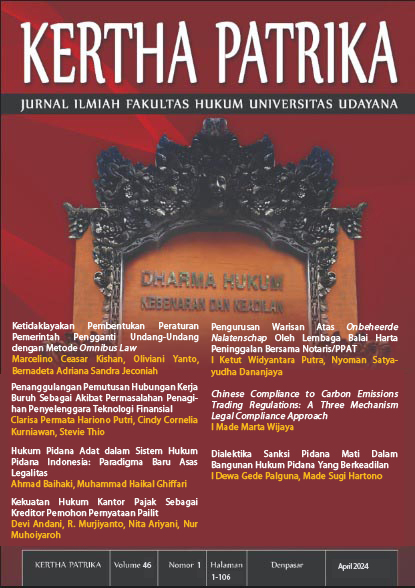Dialektika Sanksi Pidana Mati Dalam Bangunan Hukum Pidana Yang Berkeadilan
Abstract
In this study aims to unravel the synthesis of dialectics that hold and negate the formulation of death penalty sanctions in Indonesian criminal law. Using juridical-normative method, secondary data consisting of primary, secondary and tertiary legal materials are collected through document and literature study techniques and analyzed descriptively-qualitatively. The scientific mind of criminal law has undergone development from classical to modern to neo-classical (daad strafrecht to dader strafrecht to the last daad-dader strafrecht). In relation to death penalty sanction, through the Constitutional Court Decision Number 2-3/PUU-V/2007, the state has firmly determined its constitutionality although there is an interpretation that is not fully in line with one Supreme Court cassation decision Number 39 PK/Pid.Sus/2011 which is based on international developments in various countries that the death penalty sanction has been abolished. This study produces findings that the Indonesian criminal law policy related to the formulation of the death penalty sanction is a synthesis between the thesis that holds and the antithesis that negates according to the formulation in Law Number 1 of 2023 concerning the Criminal Code (KUHP) that the death penalty sanction is a special type of criminal sanction carried out through a probationary period and can then be changed to a type of life imprisonment or for a maximum period of 20 years if it meets certain qualifications. The pursuit of fair and usefulness criminal law is a dialectical process with a positioning on the balance between individual protection and collective interests.
Downloads
References
Fais Yonas Bo’a, “Pancasila Sebagai Sumber Hukum Dalam Sistem Hukum Nasional,” Jurnal Konstitusi 15, no. 1 (2018): 27–49, https://jurnalkonstitusi.mkri.id/index.php/jk/article/view/1512/351.
H. L. A. Hart, ―The Concept of Law”, edisi kedua (Oxford: Oxford University Press, 2019), hal. 13.
Inayatul Ulya and Nushan Abid, “Pemikiran Thomas Kuhn Dan Relevansinya Terhadap Keilmuan Islam,” FIKRAH: Jurnal Ilmu Aqidah dan Studi Keagamaan 3, no. 2 (2015): 249–276.
Michhael R. Gudtfred and Travis Hirchi, dalam Sudarto, Hukum dan Hukum Pidana, Alumni Bandung, 1977, hlm, 135
Muladi dan Barda Nawawi Arief, Bunga Rampai Hukum Pidana, Alumni, Bandung, 1992, hlm 65-66.
Sudarto, Hukum dan Hukum Pidana, Alumni Bandung, 1980, hlm. 15.
Sudarto, Hukum dan Hukum Pidana, Alumni, Bandung, 1977, hlm, 161.
Suhariyanto, Budi. "Penafsiran Hakim tentang Konstitusionalitas dan Pelanggaran Hak Asasi Manusia dalam Pidana Mati." Jurnal Yudisial 7, no. 3 (2014): 237-254. http://dx.doi.org/10.29123/jy.v7i3.74.
Thomas Kuhn.
Tongat, Pidana Kerja Sosial dalam Pembaharuan Hukum Pidana Indonesia, (Jakarta:
Djambatan, 2020),
Yusuf, A. W. 2015. Hukum dan Keadilan. Jurnal Ilmu Hukum, 2(1), hlm. 1–13











